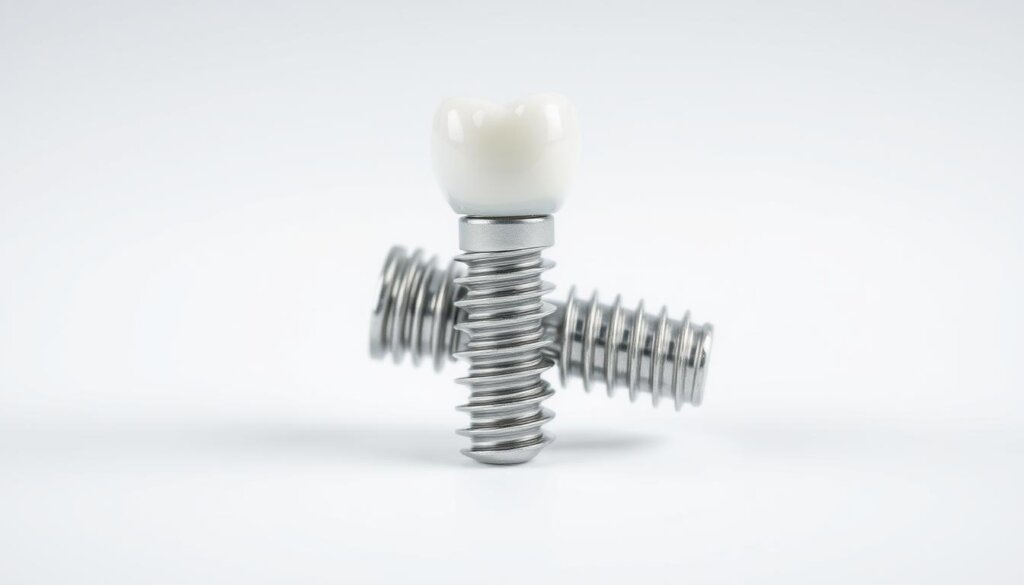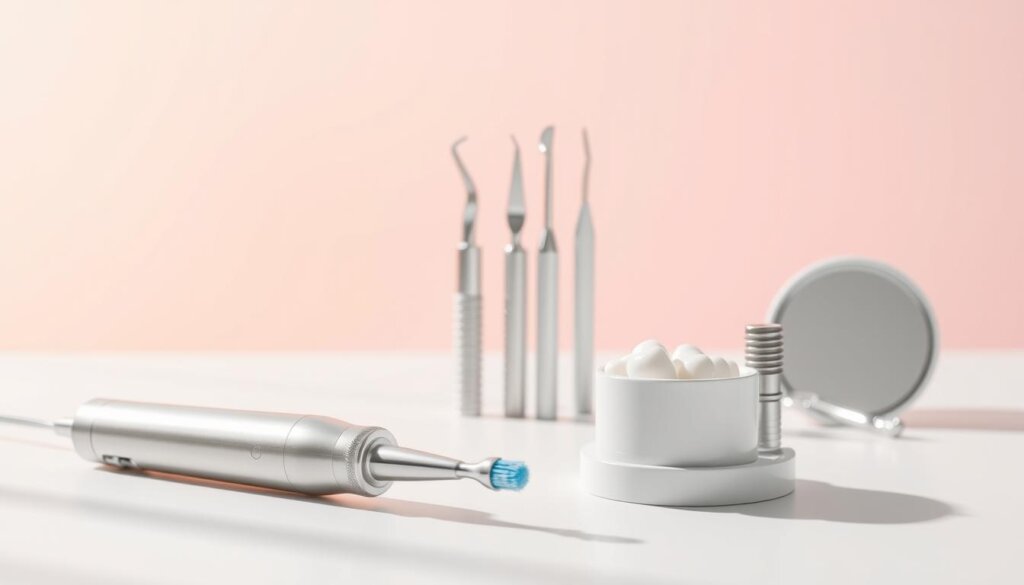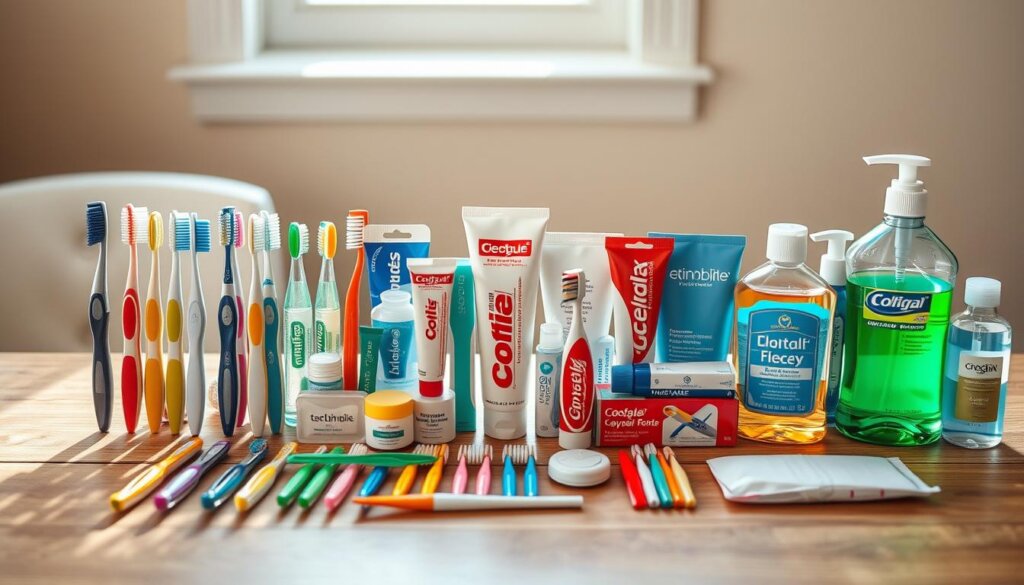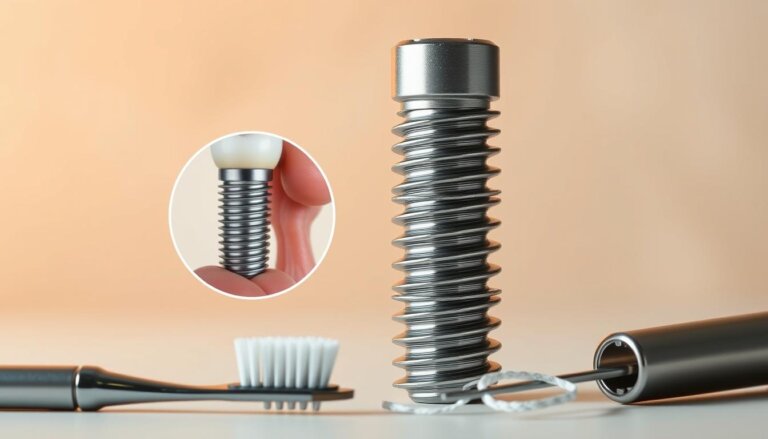How Do I Care for Dental Implants?
More than 3 million Americans now enjoy the benefits of dental implants. This number grows by about 500,000 every year. It’s essential to understand how to look after your dental implants properly. Knowing how to care for them at home is crucial for your health. It helps keep your mouth healthy for a long time and helps medical science grow.
For your dental implants to last, you need to take good care of them. Dentists are key in putting them in, but how you look after them matters just as much. Good care can make them last longer and work better. This shows how committed we are to tackling health issues and spreading knowledge.
Key Takeaways
- Over 3 million Americans currently have dental implants, a number that is rapidly growing each year, emphasizing the need for proper care information.
- Dental implants maintenance is crucial for extending the longevity and function of these prosthetic solutions.
- Professional insights on how to care for dental implants are integral to ensuring that individuals maintain their oral health investments effectively.
- Caring for dental implants at home involves a combination of daily dental hygiene practices and understanding the role of lifestyle in oral health.
- Educational clarity in sharing the best practices for dental implants is in line with our mission to enhance medical science and patient wellbeing through regenerative research.
Understanding Dental Implants
Dental implants are a big step forward in dentistry, offering a lasting fix for missing teeth. They not only fill in gaps but also work like real teeth. Knowing how they’re built and their benefits helps us see why taking care of dental implants maintenance and oral hygiene with dental implants matters.
What Are Dental Implants?
Dental implants have three main parts: a titanium post that goes into the jawbone, an abutment on top, and a custom crown that shows above the gum. The titanium post bonds with the bone over time, a process called osseointegration. This bond makes implants much sturdier than regular dentures.
Benefits of Dental Implants
Implants do more than just look good and work well. They stop the jawbone from weakening and bring back full chewing power. Taking good care of your implants, a focus known as dental implants aftercare, is vital. It helps the implants last and keeps your mouth healthy.
- Enhanced oral functionality and comfort
- Prevention of bone loss and maintenance of facial structure
- Improved oral health and easier oral hygiene with dental implants
- High success rate and reliability
Knowing how to take care of dental implants is key for those with or considering them. Keeping up with dental implants maintenance, regular dental visits, and following care guidelines is essential for their success.
The Importance of Oral Hygiene
Keeping your dental implants clean is super important for their health and longevity. Looking after them well not only makes them last longer but also helps your overall mouth health. Here are some good ways and tips to take care of your dental implants with daily brushing and flossing.
Brushing your teeth every day is key for dental implant care. It’s best to use a toothbrush with soft bristles and a special toothpaste that won’t scratch your implants. One of the best ways to brush is called the modified Bass method. You angle the brush at 45 degrees to your gums and brush gently. This helps remove plaque and keeps your gums healthy around your implants.
Daily Brushing Techniques
If you have dental implants, using the right way to brush is really important. Using gentle strokes and the correct angle, like in the modified Bass technique, helps you clean around the implant crowns and abutments thoroughly. This lowers the chance of getting diseases around your implants.
Flossing Around Implants
Flossing is just as important as brushing if you have dental implants. Using things like floss threaders or interdental brushes makes it easier to get rid of plaque around and between your implants. Flossing carefully every day, especially around the implant, can prevent peri-implantitis. This is a common problem, but you can prevent it.
- Consistency is key in maintaining your dental implants. Make brushing and flossing a part of your daily routine.
- Choose oral hygiene products that are gentle on your implants to prevent any form of physical damage.
- Periodic visits to your dentist for professional cleanings and check-ups help monitor the condition of your implants and catch any issues early.
Post-Operative Care Instructions
After getting dental implants, following the dental implant cleaning instructions closely is key. This helps with a smooth recovery and healing. The first steps after the surgery are very important. They help set the stage for the implants to integrate well and last a long time.
- Patients are advised to avoid disturbing the implant area with their tongue or fingers.
- Gentle brushing in areas away from the implants should be continued with a soft-bristled toothbrush.
- Use of antimicrobial mouthwash is recommended to keep the area free from harmful bacteria without vigorous rinsing that could dislodge the blood clot.
Managing Discomfort and Swelling
- Application of ice packs on the cheek over the area can reduce swelling effectively.
- Prescribed pain relievers should be taken as directed to manage discomfort.
- Patients should maintain a diet of soft foods to minimize pressure on the implant site during the early healing phase.
To help healing, it’s crucial to follow best practices for dental implant maintenance. Make sure to go to all follow-up visits with your dental specialist. This ensures good healing and lets you bring up any issues right away. By doing this, you recover faster and make the implants last longer.
Regular Dental Check-Ups
Keeping dental implants healthy is crucial for their long-lasting success. Regular dental check-ups are key for implant aftercare. These visits help check the implants and care for overall oral health.
At these check-ups, dental pros look at the implant, gums, and bone health. They check for any problems early to stop bigger issues.
Here’s what typically occurs during these crucial check-ups:
| Check-Up Component | Description |
|---|---|
| Visual Examination | The dentist visually inspects the implant site and surrounding gums for any signs of inflammation or infection. |
| Implant Stability Testing | Tools may be used to assess the stability of the implant, ensuring it is securely integrated with the bone. |
| Professional Cleaning | Specialized instruments are used to clean around the implants, removing plaque and tartar build-up that can lead to gum disease. |
| X-rays | Periodic X-rays are taken to monitor the health of the bone supporting the implants and to check for any underlying issues not visible during a visual examination. |
Regular check-ups are crucial for dental implant care. They’re usually advised every six months. These visits help avoid severe problems with the implants and oral health.
Choosing the Right Oral Care Products
If you have dental implants, choosing the right oral care products is key. It’s important to select tools and products that won’t harm your implant. They should also clean your implants well.
Recommended Toothbrushes
The toothbrush you choose is very important. Go for one with soft bristles and a small head. This type makes it easier to reach all areas around the implant without hurting it. An electric toothbrush with a sensitive mode is also a good choice. It cleans well without being too rough.
Best Toothpastes for Implants
When picking a toothpaste, avoid ones with harsh abrasives. Look for toothpaste without baking soda, activated charcoal, and strong whitening agents. These can damage the implant’s surface. A low-abrasive, tartar-control toothpaste is best. It keeps your dental hygiene up without damaging the implant.
The table below shows the best toothbrush and toothpaste for dental implants. These products are chosen to avoid damage and keep your implant clean.
| Product Type | Recommended Features | Reason for Recommendation |
|---|---|---|
| Toothbrush | Soft bristles, small head | Prevents damage to implants and aides in cleaning hard-to-reach areas |
| Toothpaste | Low-abrasive, without harsh whitening agents | Protects implant surface integrity while providing effective cleaning |
Avoiding Certain Foods
Proper care for dental implants means more than just cleaning well. It also requires smart eating choices. Right after you get your implants, what you eat greatly affects healing. It also impacts how well your implants will work in the long run.
Knowing which foods to skip is key for a smooth recovery. Hard, sticky, or very crunchy foods can put too much pressure on your new implant. This pressure might cause the implant to move or get damaged. We’ve made a table below to show what foods to avoid at first. We also suggest some safe options that won’t harm your implants.
| Foods to Avoid | Reason to Avoid | Alternative Foods |
|---|---|---|
| Hard candies | Can cause chipping or displacement of implants | Soft chocolates without caramel or nuts |
| Sticky caramel | May pull at the implant site | Fruit purees or smoothies |
| Crunchy vegetables | Excessive force needed to chew can disturb the implant | Steamed or boiled vegetables |
| Hard breads like baguettes | Crunching can stress the implant site | Soft breads, such as brioche or ciabatta |
For keeping dental implants in top shape, try chewing gently. And don’t use your implants to bite hard foods directly. Always check with your dentist for the best care steps for you. Each person’s needs are different.
By eating carefully and looking after your implants, you protect them. This not only saves your implants but also keeps your mouth healthy. Doing this helps your smile stay bright and working well for a long time.
The Role of Lifestyle Choices
Making the right lifestyle choices is key to keeping dental implants healthy and effective for a long time. Smoking and drinking a lot of alcohol can really harm dental implants. They make it harder for implants to work well with the bone in your jaw.
Impact of Smoking on Implants
Smoking is bad for the process that lets dental implants bond with bone, which they need to stay stable. Tobacco smoke messes with blood flow, cutting down on the oxygen and nutrients needed for healing and bone bonding. This raises the chance of the implant failing and can cause longer healing times and more problems after surgery. To take good care of implants, it’s best to quit smoking, especially before getting an implant and from then on.
Alcohol Consumption and Oral Health
Drinking a lot of alcohol isn’t good for dental implant maintenance either. Alcohol dries out your mouth, leading to less saliva. Less saliva means more bacteria and a higher chance of infections at the implant site. This can hurt the implant’s success. So, it’s smart to cut down on alcohol to keep implants in good shape.
Choosing a healthy lifestyle is important for dental implants to succeed. It’s a good idea for patients to talk about their smoking and drinking habits with their dentist. Together, they can make a plan to help keep the implants healthy for a long time.
Recognizing Problems Early
If you’re taking care of dental implants, knowing the early signs of trouble is key for your dental health. You must check your implants for any signs of change.
It’s important to know which symptoms could mean a problem. This can stop small issues from getting worse. If you feel pain, have trouble chewing, or notice swelling, you should be worried and talk to your dentist.
| Symptom | Possible Complication | Action to Take |
|---|---|---|
| Severe discomfort or pain | Possible infection or inflammation | Contact dentist immediately |
| Difficulty chewing or sudden misalignment | Implant shifting or failure | Schedule an urgent dental check-up |
| Receding gums around the implant | Gum recession could expose implant structure | Visit your dentist for gum assessment |
| Visible swelling or redness | Infection risk at the implant site | Immediate dental intervention needed |
Spotting problems early and acting fast is crucial when you have dental implants. If you notice any concerning signs, reaching out to your dentist right away is important.
Long-Term Maintenance of Implants
Taking care of dental implants is key to keeping them working well for a long time. It’s important to have a regular care routine and follow the best ways to look after them. This includes getting help from dentists and also taking care of them on your own.
Understanding that dental implants need the same level of care as real teeth is crucial. Regular visits to the dentist are a must. You can keep your dental health in check by going to professional dental services for exams and cleanings. These visits are crucial to prevent problems and make sure your implants last many years.
- Regular brushing and flossing to prevent plaque build-up
- Using implant-specific oral hygiene products recommended by dental professionals
- Avoiding habits that could damage the implants, such as chewing hard items or using teeth as tools
Besides cleaning your teeth every day, getting professional cleanings is also important. These cleanings help take care of areas that are hard to reach at home. Getting professional cleanings regularly helps find and solve any hidden issues early.
| Care Aspect | Personal Responsibility | Professional Intervention |
|---|---|---|
| Daily Cleaning | Brush twice, floss once daily | Guidance on techniques and products |
| Regular Check-Ups | Attend routine check-ups | Comprehensive exams and cleaning |
| Problem Management | Report any discomfort or abnormalities | Diagnosis and necessary treatment actions |
By following these personal and professional care guidelines closely, you can make your dental implants last longer and work better. Proper care for your implants helps keep your mouth healthy. It also boosts your overall health, confidence, and happiness.
The Connection Between Implants and Overall Health
Dental implants do more than just replace missing teeth. They play a big role in oral health and how we feel overall. Keeping dental implants clean helps keep the mouth’s structure and improves overall health. This link shows why it’s important to take care of dental implants.
Dental implants work with our body’s natural tissues. This helps keep our teeth healthy, stops jawbone loss, and keeps teeth in line. This means our smiles look good and our mouths work well.
Through diligent oral hygiene with dental implants, individuals can effectively manage their overall health, underscoring the importance of regular dental check-ups and proper aftercare routines.
Good dental implants have benefits that reach far beyond the mouth. They help us eat and digest food better. Plus, having a nice smile makes us feel better about ourselves, which is good for our overall health.
Caring for dental implants is about more than just the implants. It’s about keeping our whole health in check. This way, dental implants improve our lives in many ways, showing how our mouth’s health reflects our body’s health.
Psychological Benefits of Dental Implants
Dental implants do more than just improve how your teeth look. They offer deep psychological benefits too. By giving you a natural-looking smile, they not only make you feel good about how you look but also boost your confidence. This new confidence can improve your interactions in social and work settings.
Taking good care of your implants can make them last longer. This care makes you feel responsible and good about looking after your health. Folks who feel better about their smiles often join in more social activities. Before, they might have stayed away because they felt bad about their teeth.
- Boost in Confidence: After getting implants, many people find they’re more confident. This new confidence really helps in both work and personal areas of their life.
- Improved Social Interactions: With their smiles back, people find it easier and more fun to talk and be with others. They can be themselves without worrying.
Choosing dental implants isn’t just about looks. It’s about feeling better emotionally and psychologically too. It’s key in getting back a full, happy life. The many benefits of dental implants make taking care of them worth it. If you’re thinking about getting implants, remember they offer a lot more than just a pretty smile.
Understanding Implant Failures
Dental implants usually work well, but sometimes they can fail. Knowing why this happens helps keep your dental work lasting longer. We’ll talk about the main reasons they fail and how to stop that.
Common Causes of Failure
Implant failures don’t happen often, but when they do, it’s usually for a few reasons. Not taking care of your mouth can cause infections. These hurt the bone and gum near the implant. Other big issues are:
- Smoking, which slows down healing and messes with the implant bonding to the bone.
- Health problems like diabetes or osteoporosis that make bones weaker.
- Putting too much pressure on the implant soon after getting it, stopping it from attaching correctly.
Preventative Measures
To avoid implant failures, cleaning them right and looking after them is key. Patients should:
- Keep up with cleaning their teeth well, using a soft-bristle brush twice a day and tools designed for implants.
- Stop smoking and get help for any health issues from a doctor.
- Go for regular dentist visits to check the implant and the area around it.
Changing what you eat and not smoking are easy ways to help your dental implant last. These steps make a big difference.
By being proactive and following these care tips, patients can lower the chance of problems. This helps ensure their dental implants work well and last a long time.
Advanced Care Techniques
Dental implants need more than just brushing and flossing for their care. It’s also about using antimicrobial mouthwash and getting teeth cleaned by professionals regularly. These steps are key for a strong dental implants hygiene routine.
To take good care of dental implants, using the right mouthwash is advised. This helps avoid infections and speeds up healing after surgery. It’s crucial to use these products the way your dentist recommends.
Using Mouthwash Effectively
Antimicrobial mouthwashes are essential for dental implants care. They can clean places your toothbrush can’t reach. They lessen bacteria and stop biofilm from forming, which is important for the health of the implant.
Professional Cleanings
Getting your teeth cleaned professionally is a must to keep dental implants looking good and strong. Such cleanings get rid of plaque and tartar that brushing can’t always remove, especially near the implants. Dentists use special tools that don’t hurt the implant or the gums around it.
To make sure your dental implants are cleaned well, you need to see your dentist for these cleanings regularly. This helps avoid any issues and keeps your implants in top shape.
Caring for your mouth well is critical for the success of your dental implants in the long run. By adding these advanced care methods to your daily routine, you’re making sure your investment in your smile pays off for years to come.
Insurance and Cost Considerations
Understanding insurance and cost is key when it comes to dental implants. Patients need to know how their insurance works to avoid surprise costs. Also, keeping dental implants in good shape costs extra money over time. This must be planned for carefully.
Coverage for Dental Implants
Many dental plans see implants as a big procedure, which usually means you pay more. The starting price for implants is high. So, insurance details really matter. It’s important to check your insurance for what it pays for. This includes the implant surgery, crowns or bridges, and extra needed treatments. This helps in planning for implant care costs.
Budgeting for Long-Term Care
It’s crucial to think about the future costs of keeping dental implants in good shape. Having a budget for regular dental visits is important for implant success. People also need to save for any unexpected repairs that might be needed. Talking to dental experts helps understand these costs better. This way, patients can ensure their dental health investment pays off for a long time.






